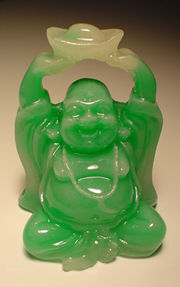Mother Worship
The Original Tradition
To Restore the Wholeness of Life

Democrats or Republicans; Labor or Tories: much of a muchness. Isn't the world waiting for something TOTALLY different?
YES, I VOTE FOR YOU AS MY NEW SPIRITUAL TEACHER
NO, I AM NOT GOING TO VOTE FOR YOU
I DON'T KNOW YET
Through "death and resurrection" the New Teacher ("Buddha") went beyond Enlightenment. He did not achieve (ascended) this, but IT descended from the Eternal Realm, without any effort on his part. He has been sent in order to "Restore the Original Wholeness". He doesn't claim ultimate authority, but as a servant is guiding people back to their Origin, the Cosmic Womb, in order to become renewed. His coming, his appearence in these most critical of times has been prophesized many centuries ago. Like "coming from the Western Grove". People are already expecting his coming, as millions of his image in temples, households, offices, restaurants and other public spaces show. His Mission as a "Green" Buddha and Servant/Messenger ("Sermes") is not limited to Buddhism alone. On the other hand, he has come to renew Heaven and Earth, inspiring other religions, organizations and people as well, saving the world from further decay and disaster, hence his universal role.
This is a single announcement. Whether the New Buddha will be effective in the world or not doesn't depend on him. Only you e.g. the needs of people can "liberate him" (...) e.g. activate his compassion....


A New "Green" Teacher
("Buddha") on the way?
TRAGEDY OF
BUDDHISM?
COULD BUDDHISM SAVE US FROM OUR
MISERY?
First, there was the
addiction to the small self Actually, this decision was based on non-acceptance He chose the opposite road, in fact he wanted the world |

| The first crucial question is: is simple acceptance
not sufficient. If I am able to say - admittedly, with my normal mind - well, this is bad,
but that is how it is, isn't that a liberation already? It surely is. Seen like this, the
Buddha indeed has overreacted. The price that he had to pay? His noble response was based
on non-acceptance. It is a truth few Buddhists can accept..... Positively seen, the Buddha added something crucial to human existence. In his efforts to escape from the "cycle of birth and death" he reached the Other Shore, the Dimension that is beyond everything tangible, visible and knowable. It is the realm of Awareness, Enlightenment and the Pure Land. Through it there appears to be an inner distance between Me and my small self The surprise: because of your non-attachment your acceptance becomes complete. Because nothing touches your innermost Core you can allow everything to enter your inner Space. It is indeed a very decisive surplus-value to your normal acceptance abilities. The negative part: despite that, your original non-acceptance attitude remains the same. The motivation behind your practice is decisive....... That's why, in the course of time "escaping" from the world did become the main obsession in Buddhism. Of course, always considered to be an instrument, a methodology only, justified by: "once you are Enlightened, then you will embrace the world as it is". But, as stated above: do you really first have to be Enlightened in order to accept the world? Has the price not been too high? Didn't Buddhism neglect the world in favor of its fear? Wasn't this all the consequence of a too early conclusion (by the Buddha), that the spiritual Path is all about escaping from suffering? One may assume that he personally was afraid of it. Did that contribute to all later developments? The more you emphasize "escape" the more difficult it is to return Denouncing "the cycle of birth and death" became its core ritual. In all sutra's, treatises, canons, essays, books from the very beginning this is repeated like a mantra. Did (do) they realize what they are saying? The "cycle of birth and death" is equal to life itself. Life as it manifests itself through our five senses, yes, surely. But is it therefore of less value? Almost a devil, like in Christianity? Indeed, these two religions have more in common than one would think. The consequences are bitter, now that we have to acknowledge that both have failed to protect, nurture and cherish our earthly roots. Not only that. By denying the existence of the ego, the ego has dominated the entire culture. "What you deny will dominate you". "No ego anymore, once you are Enlightened" has proven to be a trap Because reality proves, that even after Full Enlightenment the ego will return. A whole new chapter will begin on your spiritual Path. It is centered around the necessity of integrating the small self into the New Self, a process that may take decades. This chapter has no place in Buddhism, since the existence of personality is denied! This has worked in Asia, for the West this is a disaster O, sure, an increasing number of Buddhist teachers have learned a lesson, since they started their mission in the West. Unfortunately, this couldn't turn the degeneration Buddhism is in. There must be good (bad) reasons for the decline, as we will see. No doubt, the Buddha was sincere in formulating his teachings. But was his starting point really the right one? Is life suffering and subsequently the purpose of life to escape from it? Wouldn't we have that costly peace of mind, if we simply would accept life as it is, right from the start? That is the first and most crucial question every sincere Buddhist has to ask him of herself. The second aspect that especially today troubles Buddhism is "liberation by your own effort", since every effort originates from the ego and returns to it...... And thus strengthening what you try to overcome..... At the time of the Buddha this was different. Strength of mind had to be emphasized, since society was completely lethargic. But today? Today, in Western societies the situation is opposite. "To make a difference" is where it is all about. And why only making difference with a new tie, girlfriend or car? Aren't there more promising targets? O, yes one provided by Buddhism: Enlightenment If the paradigm that "after Enlightenment you are liberated from the ego for the rest of your life" would be true, trying to attain is indeed harmless. There is no threat from within or without. As stated above this proves to be an illusion, though. The ego does return. And in many cases will try to use Realization for its own purposes: status, influence, power, money and worse. The Vessel of Liberation has fallen into the hands of "spiritual" pirates Even in schools where the emphasis is lying on "awareness" and the "herenow" - Zen, Vipassana - the underlying drive is often Enlightenment. In this regard the East wasn't less materialistic than the West. It openly "went for it". The difference, though was, that spiritual achievement was scrutinized by the Master, the monastery community, the village and the culture as a whole. Balance was carefully cultivated. In the West no-one is guiding you. On the contrary, spiritual achievement is often used for the rudest of material gains*. * Think of nowadays' "mindfulness trainings" to support egoistic, self-indulgent lifestyle or "Zen for managers" to promote the effectiveness e.g. the profit-making of the company.... At the moment in history where the Ultimate Treasure has turned into a commodity, an object to have, where Liberation has become an addiction, then, to our great grief, Buddhism has been deprived of its inherent Power. It is like a bank that lost all its money......To strive for "more" Liberation is useless, because the striving is the problem. Moreover, Western society has no inherent corrective mechanisms, that could achieve some kind of balance. Hence, Buddhism as as system based on self-effort is at its end. To save it we have to go beyond Enlightenment. As always, liberation comes from an dimension that was hitherto neglected.... Summarizing: in 2500 years societies have changed to such an extent, that what was truth then is a trap now. To start with Buddha's definition - "Life is Suffering" - appears to be the cause for a life-denying attitude, which doesn't comply with our reality. Our suffering on the other hand is "to be separated, alienated from life". Reality is disappearing in favor of a "virtual world". Individually and collectively, we have lost contact with not only our True Self, but also with Our bodies and nature, our feelings and suppressed emotions, our lust for life, feminity, love, eroticism and sex....Yes, a lot more complicated than the simple Path to Enlightenment. But we shouldn't throw the baby out with the bath water....A new start can be made, in which we adjust new values to an old practice. Self-effort has great dangers, therefore schools like the Pure Land have to emphasized. There Enlightenment is a gift, something to be eternally grateful for Doesn't that sound much better than the "realization you have attained by your own efforts?" It is all about the final outcome. Will we be a joyful, grateful person or one who boasts about his/her achievements? Secondly, are we going to embrace the world as it is or are we trying to escape from it? Looking with contempt to the ignorance of common people, those who live their miserable lives in samsara, like so many (Hinayana) monks do? Don't spend a whole life with "personal liberation", in a way that only old age may eventually bring you the necessary mildness e.g. acceptance of life..... One thing hasn't been elaborated here, yet. From the early beginnings, it were the women who were considered to be responsible for the "cycle of birth and death" and therefore the suffering in the world. The face Buddhism is showing to the West is mild in this regard. But go to Asia and attend a Buddhist service for local people. You will be shocked by what you hear there. The condemnation of the world is unchanged. And with it the attitude toward women On my Path my greatest crisis, like elaborated above, was indeed that after Full Enlightenment, my ego did come back, as in all cases, and that was rather unique, after ten years of Transcendental Bliss. Immediately, I was confronted by the tendency of identifying myself with my Realization. Even though this Realization had not been the outcome of self-effort! It came by surprise, totally unexpected. To start with, prior to the Light my entire body/mind was wiped out by Absolute Nothingness. What has this to do with women in Buddhism? Well, to "get rid" of my addiction, Enlightenment couldn't help me anymore. It had turned into the object, thus loosing its liberating potentiality. You might start artificially cultivate it, in order to create a barrier for the ego. But this kind of self-deception I declined. Rather, I chose to enter hell. After many years I got so desperate, that I again started searching for the Truth. I found it in Absolute Nothingness. Going back to my Great Experience I realized that there had been a sequence. First Blackness and then the Light. Ergo: the Light was born out of Darkness! There appears to be something beyond the Light. The Light is not the Ultimate Reality. This "something beyond" is the Origin, something that is more powerful than Enlightenment! I shouted with joy, and although being a very unfamiliar thought, this didn't leave my mind: Darkness as the redeemer from my Light obsession...... What is this dark underlying Reality? If it is giving birth to the Light, then It must Be a birthgiver. Something that has to be defined as feminine! Soon an entire universe opened itself up to me. "The Womb of all Buddha's"* wasn't that a connection? Almost. In Buddhism this means the "womb" of the ego, which is Enlightenment. It is equal to "Emptiness" or "Nothingness" meaning the realm in which the ego disappears. * Prajnaparamita Sutra It is Emptiness to the ego, but not Absolute Emptiness! Therefore, the uniqueness of Buddhism, only equalled by Meister Eckhart, is proven by its concept of "Emptiness beyond Emptiness". The only problem: nobody knows what it is, because only a few have really experienced it. Even the Buddha himself did not realize it. What he experienced under the Bodhi Tree was Full Enlightenment - yes, Emptiness - but not "Emptiness beyond Emptiness". So he guessed. He called it "Nirvana", an abstract term with relationship only to speculation. On his death bed it is said that "he entered Nirvana", which is correct. Because I didn't attain it by my own effort, I can say with a peaceful Heart, that to me it was indeed granted. Subsequently, I grasped the full reality of it. "Nirvana" is the Cosmic Womb, the Dark Abyss of the universe, giving birth to both the Light (Buddhahood) and the world, both continuously returning to their Origin. Eureka! I had found the Ultimate Mystery of Life, the Origin of All, the Cosmic Vacuum of physics or ...... "Great Mother" If life is being born - and that is the reality - then the credits go exclusively to the Birthgiver. By nature the Cosmic Womb is feminine. It is the Universal Mother. It is connected to the ancient Mother Religion, still so prominent in Hinduism (but patriarchized in the sense that instead of being the Origin of Brahma, She became his consort "Shakti"). The point is that Absolute Emptiness cannot be achieved, attained or possessed. Suddenly, the (male) ego doesn't have a target anymore, with which he can identify himself. For me personally, this was the True and Ultimate Liberation. The Mother freed me from my addiction to the Light. "Free from freedom" through becoming "Son of the Mother". Not a guru with absolute claims, but a New Living Teacher - a Servant/Messenger - in service of the Cosmic Mother. Surrender, worship and veneration increasingly got more ground in my life. A life more and more filled with love, joy and gratitude. Nothing to strive for, instead constantly tuning in to my Origin. It is the beginning of a new Era, announced by a new Living "Green" Buddha, the One who stresses Liberation as a Grace, a Gift, something that cannot be possessed. The Origin is All-Embracing, like a Mother to Her children. Being part of it, I also include everything, without exception. So, we should accept suffering right from the start, recognizing the "cycle of birth and death" as the ruling principle of the universe; so, no contemptuous attitude toward "samsara" anymore, appreciation of the "five senses" as a means to joyfully enjoying the world, awareness not as an excuse to abandon the self, but to embrace it, celebrating the feminine e.g. women without reluctance, etc. etc. So my starting point: life is as it is. No further definition. No escapes either. Of course, becoming aware is crucial for a stable Self. With self-effort I go to certain well-defined limits. Beyond those limits I drop my efforts, giving my spiritual Path out of hands. Our modern life is characterized by fragmentation and alienation, therefore my salvation lies in restoring Wholeness, integrating all parts that are lost. I will not identify with any of my achievements, rather bring balance into my life through surrender, worshipping the Cosmic Mother, the Birthgiver of Buddhahood. Suddenly, the
Lightning Then, voluntarily
re-entering the world, once again Buddhists from around the world, in order to save Enlightenment we have to go beyond. Return to the purity of Heart, remove all traces of greed and self-glorification, drop every self-gratifying self-effort. There is REALLY nothing to achieve, realize or attain. Make an inner shift from a Sakyamuni to a Maitreya Mind. The latter not claiming ultimate authority but serving the Ultimate Unattainable Truth: "Emptiness beyond Emptiness", "Nirvana", the Cosmic Womb. This Empty Womb draws us in from Eternity, so, we only have to give in to Her invitation...... True effortlessness can not be achieved by yourself.....It is a contradiction. You have to tune in on the "Other Power", the Universal Womb, the One that is All-Embracing. She is the Vacuum, the Abbyss into which everything - including the Light/Buddhahood - is continuously drawn in, the latter subsequently being renewed. So, true effortlessness is to tune in to the ingoing Power - the energy that draws you from the periphery towards the Center - which is there from Eternity, the only thing you have "to do" is to surf on Mother's waves.... The ego should have NOTHING to strive for, anymore. The irony is that Buddhism has known this from the beginning. It just didn't draw the right conclusions from its own ultimate teaching. Thus, only surrender can purify you from all attachments. By worshipping the Universal Mother, you will become like children once again, innocent and wise, gentle and strong, free and committed, non-attached and enjoying, foolish and determined, silent and dancing, learning and teaching, loving and caring...... just follow Maitreya's laughter...... Her Blessings to you all |
Read
also:
AFTER CHRISTIANITY, WHAT THEN?
THE LAST AND DEFINITIVE "MARIAN DOGMA"
NEW AGE SPIRITUALITY: THE ANSWER TO OUR ANGUISH?
THE TRAGEDY OF BUDDHISM
COULD BUDDHISM PERHAPS SAVE YOU?
FINALLY:
THE ORIGINAL TRADITION

In order to have a full overview of the
work,
we recommend you to first going back to the beginning of
Han Marie Stiekema's website.
Please, click HOME and proceed from there.
2003 © Copyright Han Marie
Stiekema. All rights reserved.
Everyone may use this website as a source of inspiration. However, since it
is freely given, no-one can claim, copy or derive any text, rights,
position or status from this website.
Last revising: 08/09/12